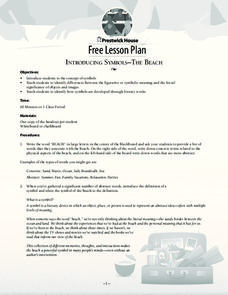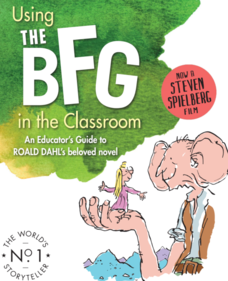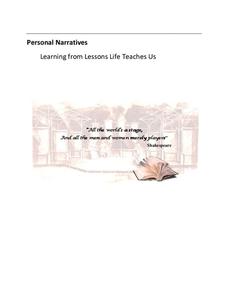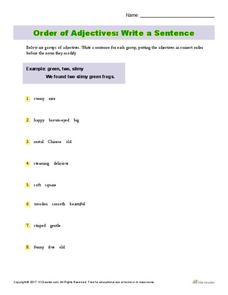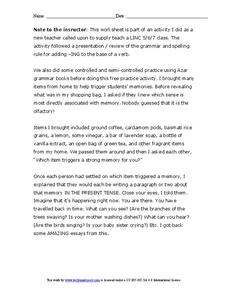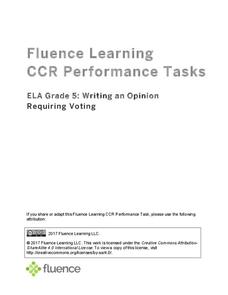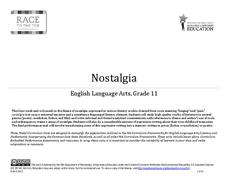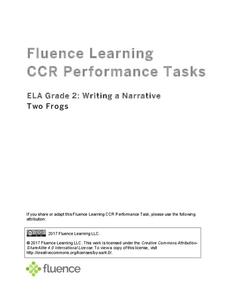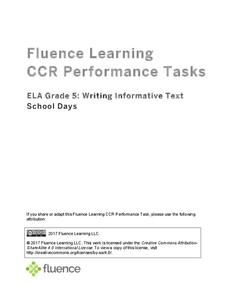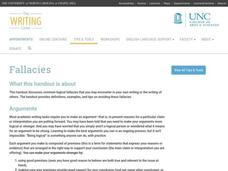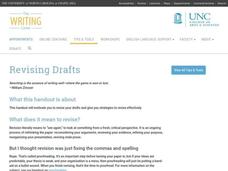Prestwick House
Introducing Symbols–The Beach
Looking for a way to introduce class members to the concept of symbolism and multiple levels of meaning? Readers examine two different passages about the beach and consider how the writers use concrete objects, and places to...
Roald Dahl
Using The BFG in the Classroom
Use a resource that highlights Roald Dahl's seven tips for imaginative writing while reading The BFG. The activities encourage learners to become creative writers through finding harmony, establishing stamina, engaging in imaginative...
Nosapo
Learn the Alphabet
Carefully trace each letter of the alphabet in upper- and lowercase. Using traceable letters, young writers practice their handwriting skills.
Thoughtful Education Press
Personal Narratives: Learning from Lessons Life Teaches Us
"First Appearance," Mark Twain's tale about overcoming stage fright, serves as a model of a personal narrative and gets young writers thinking about milestones in their own lives. After examining student models and considering the...
Vanier College
Analyzing Short Stories/Novels
Good questions can help focus readers' attention on the elements writers use to add depth to their stories. The questions on this worksheet do just that and encourage readers to think critically about a story and author's purpose.
K12 Reader
Adjectives Describe
Vivid writers all start out the same way: learning in elementary school how to use a variety of adjectives! Young grammarians add adjectives to eight fill-in-the-blank sentences.
K12 Reader
Order of Adjectives: Fill in the Blank
Would you rather have a big shiny diamond ring or a diamond shiny big ring? Word choice and the order of adjectives can affect what a writer is trying to say. Teach young learners how to clarify their writing with a set of...
K12 Reader
Order of Adjectives: Write a Sentence
Knowing the parts of speech can make you a better writer! Young grammarians use sets of two and three adjectives to write engaging sentences, taking care to use the adjectives in the correct order.
K12 Reader
The Little Lost Wolf
Oh no! Little Woof, the wolf pup, has gone missing in the woods. What happens next? Young writers practice narrative writing with an interesting prompt.
Curated OER
Scent-Inspired Composition
Our sense of smell has a wonderful way of bringing back memories. Unlock those memories with an olfactory-inspired writing prompt that challenges writers to tell a story about a specific smell and the memories it conjures.
K12 Reader
Write a Noun for the Adjectives
Adjectives can't exist without something to describe! Young writers find nouns to match ten short adjectives in a straightforward grammar worksheet.
Fluence Learning
Writing an Opinion Requiring Voting
Challenge writers to compose an essay detailing their stance on, and the history of, voting. Three assignments, each broken down into three parts, requires fifth graders to take notes, read and complete charts, write paragraphs, compare...
Massachusetts Department of Education
Nostalgia
To prepare for crafting their own memoir, class members examine poetry by Margaret Atwood, Billy Collins, Robert Hayden, and Claude McKay, stories by Richard Rodriquez and Willa Cather, and Barry Levinson's film Avalon. They examine...
Santa Monica-Malibu Unified School District
Parts of Speech Pre-Test: The Building Blocks of Grammar
Help your learners get a good grasp on grammar. An insightful pre-test allows teachers to learn about their young writers' knowledge of the building blocks of grammar, so they can begin building a unit of study. It includes a...
Santa Monica-Malibu Unified School District
Parts of Speech Adjectives: Building Blocks of Grammar
How do you describe a jellyfish? Individuals write adjectives for Nomura's jellyfish, take notes, and check understanding with a formative assessment. Notes include the definition for adjectives, guiding questions to help writers...
Digital Writing and Research Lab's – Lesson Plans
Teaching Close Reading through Short Composition/Revision
This activity may have writers evaluate short compositions, but their subjects are quite tall: great Americans. Pupils read one another's compositions and closely examine how specific phrases and diction contribute to shaping American...
ReadWriteThink
A Picture's Worth a Thousand Words: From Image to Detailed Narrative
A picture's worth a thousand words—and even more inspiration! A visual activity uses photographs to inspire writers. The process teaches aspects of narrative writing, such as point of view and characterization.
Art Educators of New Jersey
Exploring Eric Carle’s Painted Collage
Where does inspiration come from? Where do writers get their ideas? What about visual artists? A PowerPoint and a video introduce middle schoolers to children's author and illustrator Eric Carle and how he found inspiration in the work...
Fluence Learning
Writing a Narrative: Two Frogs
Three options offer young writers the opportunity to read a short story, answer questions, and write a response. A handy language arts resource focuses on reading comprehension and analyziing the story's lesson: look before you leap.
Fluence Learning
Writing an Opinion: Student Council
A three-part assessment challenges scholars to write opinion essays covering the topic of the student council. After reading three passages, writers complete a chart, work with peers to complete a mini-research project, answer...
Fluence Learning
Writing Informative Text: School Days
A three-part writing assessment challenges scholars to think critically about schools of the past and present. Learners read informative texts, answer questions to prepare for a discussion, research in small groups, complete a Venn...
University of North Carolina
Evidence
You can claim that soda rots people's teeth or that dinosaurs were actually birds, but your claim will not stand up if it is not backed by evidence. A handout from UNC Writing Center, the seventh in the Writing the Paper series of 24,...
University of North Carolina
Fallacies
All teacher workrooms contain a coffee maker, therefore all teachers must be addicted to coffee. That sentence represents a logical fallacy (although it may be true from some), a topic the seventh installment in the 24-part Writing the...
University of North Carolina
Revising Drafts
Don't simply proofread ... revise instead! Revising drafts is the topic of the 17th handout in UNC's Writing the Paper series of 24 lessons. Writers discover the importance of revision, as well as steps to follow during the process.
Other popular searches
- Freedom Writers
- Writers Workshop
- Writers Notebook
- Writers Craft
- Freedom Writers Movie
- Writers Craft Story Starters
- Natural History Writers
- Writer's Workshop
- Writers Block
- Freedom Writers Diary
- Women Writers
- Beat Writers


